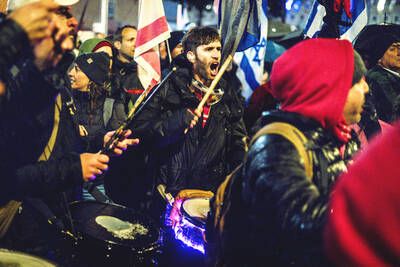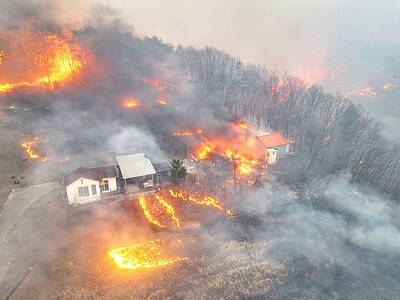East Timor’s government survived a raucous no-confidence vote in parliament over its decision to free an Indonesian militia leader accused of crimes against humanity, officials said yesterday.
Members of the opposition Fretilin party and allies brought the motion before the house, accusing the government of East Timorese Prime Minister Xanana Gusmao of breaking the law by releasing militia leader Martenus Bere from custody.
After a fiery day-long debate which was broadcast on national TV television, members of parliament voted for the motion late yesterday by a margin of 39 against to 25, officials said.
Former prime minister Mari Alkatiri led the charge against the government, saying the decision to release Bere less than a month after his arrest in August was unconstitutional and undermined East Timor’s independence.
Bere was arrested after crossing into East Timor on Aug. 8, five years after being indicted for his role in a string of human rights violations including the 1999 Suai church massacre in which up to 200 people were killed.
“This government has become accustomed to disrespecting the Constitution and the law, opposing national and international laws,” Alkatiri said.
Gusmao, who led East Timor’s resistance against Indonesian rule before its 1999 vote for independence, defended freeing Bere from jail as a “political decision” that was “in the national interest.”
Bere has stayed at the Indonesian embassy in Dili since his Aug. 30 release from custody.
Government members of parliament said Bere’s release was necessary to prevent reprisals against Timorese studying in Indonesia, and said a trial would have done nothing to improve reconciliation with Jakarta.
Gusmao and East Timorese President Jose Ramos-Horta have said reconciliation with Indonesia is more important than dwelling on its crimes, despite UN calls for an international tribunal.
Indonesia’s brutal 24-year occupation of East Timor ended with bloody violence by Indonesian troops and their militia proxies who opposed the 1999 UN-backed independence vote.

DEATH CONSTANTLY LOOMING: Decades of detention took a major toll on Iwao Hakamada’s mental health, his lawyers describing him as ‘living in a world of fantasy’ A Japanese man wrongly convicted of murder who was the world’s longest-serving death row inmate has been awarded US$1.44 million in compensation, an official said yesterday. The payout represents ¥12,500 (US$83) for each day of the more than four decades that Iwao Hakamada spent in detention, most of it on death row when each day could have been his last. It is a record for compensation of this kind, Japanese media said. The former boxer, now 89, was exonerated last year of a 1966 quadruple murder after a tireless campaign by his sister and others. The case sparked scrutiny of the justice system in

The head of Shin Bet, Israel’s domestic intelligence agency, was sacked yesterday, days after Israeli Prime Minister Benjamin Netanyahu said he no longer trusts him, and fallout from a report on the Oct. 7, 2023, Hamas attack. “The Government unanimously approved Prime Minister Benjamin Netanyahu’s proposal to end ISA Director Ronen Bar’s term of office,” a statement said. He is to leave his post when his successor is appointed by April 10 at the latest, the statement said. Netanyahu on Sunday cited an “ongoing lack of trust” as the reason for moving to dismiss Bar, who joined the agency in 1993. Bar, meant to

DITCH TACTICS: Kenyan officers were on their way to rescue Haitian police stuck in a ditch suspected to have been deliberately dug by Haitian gang members A Kenyan policeman deployed in Haiti has gone missing after violent gangs attacked a group of officers on a rescue mission, a UN-backed multinational security mission said in a statement yesterday. The Kenyan officers on Tuesday were on their way to rescue Haitian police stuck in a ditch “suspected to have been deliberately dug by gangs,” the statement said, adding that “specialized teams have been deployed” to search for the missing officer. Local media outlets in Haiti reported that the officer had been killed and videos of a lifeless man clothed in Kenyan uniform were shared on social media. Gang violence has left

‘HUMAN NEGLIGENCE’: The fire is believed to have been caused by someone who was visiting an ancestral grave and accidentally started the blaze, the acting president said Deadly wildfires in South Korea worsened overnight, officials said yesterday, as dry, windy weather hampered efforts to contain one of the nation’s worst-ever fire outbreaks. More than a dozen different blazes broke out over the weekend, with Acting South Korean Interior and Safety Minister Ko Ki-dong reporting thousands of hectares burned and four people killed. “The wildfires have so far affected about 14,694 hectares, with damage continuing to grow,” Ko said. The extent of damage would make the fires collectively the third-largest in South Korea’s history. The largest was an April 2000 blaze that scorched 23,913 hectares across the east coast. More than 3,000